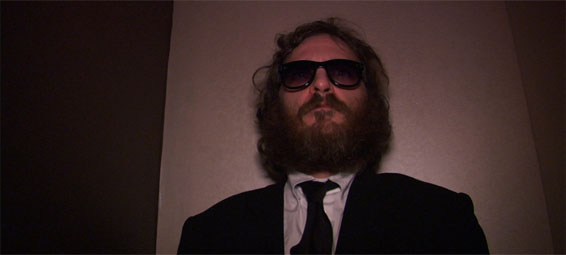By the end of Casey Affleck’s directorial debut, I’m Still Here, a documentary about his brother-in-law, actor Joaquin Phoenix, it is still hard to tell if the movie is an honest portrayal of a celebrity in personal crisis, or an elaborate put-on — a fiction film in which Phoenix dedicated a year of his life to playing a role that doubled as his real life. That doubt is part of what makes I’m Still Here equal parts interesting and frustrating, and it says much about how far our trust in the visual medium of moving pictures has degraded in recent years.
If we doubt I’m Still Here, the evidence is pulled from scenes that seem staged, but the supposedly staged scenes are the ones that are comprised of the kinds of shots mock documentaries used to use to tell their audiences they are trying to be real — long glances at the camera by self-aware subjects, subjects setting up the camera themselves and delivering awkward lines of dialogue, etc. In other words, the techniques used by everything from This is Spinal Tap to The Office to half-trick audiences into thinking what they are watching is real recorded life are now the very shots we no longer trust as documented reality. It is one of many theoretical subplots of Affleck’s surprisingly dense, head-spinning film about celebrity: once the camera is on, is the truth inevitably obscured?
I’m Still Here follows two-time Academy Award nominee Joaquin Phoenix as he tries to reinvent his career beginning in 2008. Early in the movie, during one of Phoenix’s many jumbled, confusing rants, the actor says something about how he is tired of being a puppet for someone else’s ideas, instead wanting to pursue something artistically that allows him to show what is inside him. What follows is a year’s worth of self-destructive neuroses that feel part Guido from Fellini’s 8 ½, part Thom Yorke in the Radiohead tour documentary Meeting People is Easy, and part like a child actor throwing a temper tantrum on the set of Romper Room.
The main thrust of the film’s plot is Phoenix’s efforts to become a hip-hop artist, which sets him on a chase around the country as he tries to find face time with famed producer Sean “P Diddy” Combs. Along the way he becomes the laughingstock of Hollywood, largely as the result of a disastrous appearance on the David Letterman show. As the celebrity media blitz wonders what is happening to Joaquin Phoenix, we see it. He does drugs, has sex with prostitutes and groupies, fights with his friends and assistants, frets over his life and career, and in one particularly raw and disgusting moment, is the victim of a retaliation by one of his friends/lackeys who defecates on Phoenix’s face while he sleeps. Affleck seems to leave nothing out, which is either a play for stark honesty or one of the director/star’s ways of making us believe he is giving us stark honesty.
As we encounter him in I’m Still Here, Phoenix is an incorrigible brute – indulgent, self-absorbed, abusive, overly-aggressive, disloyal, and mean-spirited. When things don’t go right for him, he lashes out at and belittles the people around him – various friends and assistants – often irrationally blaming them for his own mistakes. Phoenix’s best moments are little more than cackle-drenched fits, fueled by cocaine, marijuana, or alcohol, that make Phoenix seem like nothing more than your spoiled friend from junior high with the overactive self esteem. The longer he raves about realizing his true artistic self, the more you wonder what on earth this overgrown child has to say about anything.
You want I’m Still Here to be fiction, because if it is, there is an art to Phoenix’s performance. He uses his body like Brando in Last Tango in Paris, creating a kind of physical tension with his screen presence, setting his own bulk up as the source of his strength and the weighted loadstone that is pulling him under.
And that’s the rub about the confusing truthfulness of I’m Still Here. If this is really a documentary, then Joaquin Phoenix is a repulsive subject, a solipsistic monster who confirms all of our bad thoughts about pampered, over-stuffed celebrities. If I’m Still Here is fiction (or part fiction), than Phoenix is playing the role of a kind of celebrity martyr, offering his public life as a sacrifice of ridicule and distain in order to make an artistic statement about the way celebrity rips one’s personae from the individual who finds himself in the role of celebrity. That we are never tipped either way is, at best, a reflection of Affleck’s directorial and intellectual naivety. At worst, this confusion betrays a disdain on the part of a cynical celebrity towards his own audience.
The last scene of I’m Still Here is a confusing, albeit beautiful, mix of these two possible readings of the movie. Phoenix has fled to Panama to be with his father. He goes swimming in a river where he used to swim with his brothers and sisters when he was a child. A long shot follows Phoenix as he pushes through the murky river before submerging completely in the water. The credits roll, and we never see him emerge. Is this a metaphor? Is Phoenix sinking or disappearing into himself? Or has this scene set up Affleck’s movie as Phoenix’s on-screen resurrection? Has Joaquin really just recast himself as the “river phoenix?”





